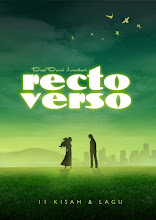What is your reason for
becoming a writer? Do you think that some writers may have the same reason at
the first they start this field? Why?
As
long as I remember, I always have a strong inclination towards story crafting.
I enjoyed the sensation of being carried away by a story, and I’d like to do
the same to others. So, basically it’s been a hobby since I was a child. I
guess many writers felt the same passion early on.
Back then, there were
some issues regarding to the regulation of royalty payment and the tax. I
believe you as one of the experienced writers, you do know exactly what the
problems are. In short explanation, what is the real problem that the writers
(in this case Indonesian writers) have to struggle with?
In
general, it’s not that easy to be a writer as a sole profession. Only the
best-selling books can generate enough significant income to provide a living,
and only a handful writers can be the best-selling ones. The issue with tax is,
our taxation system doesn’t reflect its full understanding yet on the
productivity cycle and the income pattern of a writer. We’re in the same
category with artists, while how we generate income is far different. Royalties
are considered passive income, while in reality writers need to actively create
and promote their works.
Based on the 2 notes
that you wrote and published on your Facebook page (attached), you are aware
about the dilemma of Indonesian writers. But then, as you are now, you are
successful in this field and known by most of the writers in Indonesia. Had you
went through the problem too (as stated in the 2nd question) or do
you still struggle with it until now? How do you overcome it?
I
started out my writer career by doing self-publishing. And, lucky enough, the
sales of my book was very good at that time. Writing was also not my sole
profession because I was already a professional singer first. I had challenges
in managing self publishing, but I didn’t struggle financially. To overcome it,
I decided to work together with a publisher on my second book. Therefore, I
could focus on the creative aspect of my work and let others handle the
business aspect. But of course, my situation may not apply to all writers. In
my article, I pointed the general situations with writers in Indonesia.
Talking about the
process of publishing a book, can you share your experience about it? Was there any problem in the process? If
there was, what was it? Do you have any idea how to solve similar problems in
the future?
If
you go to a publisher, then you need to have a strong manuscript. The story
must be relatable. More polished is better, because the editor can gauge our
writing ability and maturity from how we prepare our manuscript. You also need
to find the right publisher. Don’t go with a nonfiction manuscript to a
publisher that mostly publish fictions, for instance. So, know your own book
and know which door to knock. If you’re doing self- publishing, then of course
you will need capital to do it. You’ll need to do all the tasks that a
publisher usually does, which include distribution planning, promotion
planning, sales planning, etc. Both has its own advantage and challenge.
If the government still
ignores the unsolved problem, do you think it will impact the next generation
of Indonesian writers? How so?
I
think, writing as a profession will remain a secondary job for most. We’ll have
only few dedicated writers, thus a slow growth in literacy outcomes.
Eliminating the PPN from all books and giving the right tax treatments for
writers will be a great stimulus for Indonesian literacy.
What about the readers?
Will it (refers to previous question) brings effects to the interest in reading
of Indonesian?
Eliminating
PPN from all books will make books become more affordable to people. Readers
may also enjoy more various themes and increasing numbers of books from more
writers.
While waiting for the
government to make a move and take actions to the matters of Indonesian writers
problems, what do you suggest or any advises for to-be writers out there, that
have plan to publish their masterpiece?
We
all should be doing what we love. Tax is one thing, and there are rooms to
improve on that matter. But, however the situation is, we should always keep
writing our hearts out, do what we love best.
Is there any additional
advice for the writers in Indonesia that might be considered as an important
thing to be prepared before and after they send their manuscript to publisher?
Writing
is like a muscle. You need to use it a lot to grow stronger, to know yourself
better. If you want to become a professional writer, you should perceive
yourself like an athlete going for a race. You need to train. Learn as much as
you can about writing, from books, workshops, and most importantly, from trying
it often. There’s no shortcut to writing. It’s
skill that needs a lifetime to master.
















